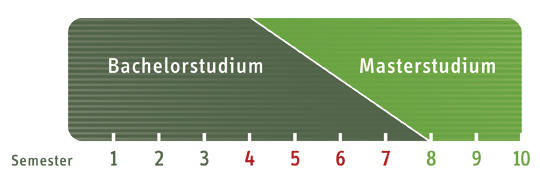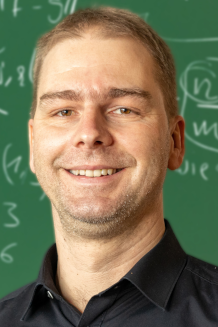Industrial Mathematics, Bachelor of Science (B.Sc.) / Master of Science (M.Sc.)
| Standard period of study: |
|
| Start of studies: |
|
| Entrance requirement: |
|
| Language: |
|
Application
There is no admission restriction for this degree program. Application is made online. The respective study program is called "Mathematik". (For the Master phase one has to select the option "konsekutiver Master" in "Form des Studiums".) The choice of the field of study, whether Mathematics, Mathematics with Computer Science, Industrial Mathematics, Financial Mathematics oder Business Mathematics is made later after the start of studies without any bureaucracy.Applications can be sent in until shortly before the start of the semester, see also term deadlines.
The change to another field of study is generally possible during the studies. Please consider the special features of the minor subject respectively the technical minor subject of the other fields of study. It is recommended to contact your academic advisor .
 If one decides during the Bachelor to continue with the Master studies in the combined Bachelor/Master degree program, one can already attend courses
of the Master phase during the Bachelor phase, whose successful passing will be accredited in the Master program. This method prevents delays
in the timing of the studies which otherwise might arise in the organization of the transition from the Bachelor to the Master studies.
If one decides during the Bachelor to continue with the Master studies in the combined Bachelor/Master degree program, one can already attend courses
of the Master phase during the Bachelor phase, whose successful passing will be accredited in the Master program. This method prevents delays
in the timing of the studies which otherwise might arise in the organization of the transition from the Bachelor to the Master studies.
Bachelor study program Industrial Mathematics
In comparison with a traditional studies in mathematics, the study program Industrial Mathematics focuses, besides a solid education in mathematical fields, also in a field of technical application and computer science. The ratio of these three components are about 65:20:15. The field of technical application can be chosen from- Electrical Engineering
- Mechanical Engineering
- Medical Engineering
- Physics.
The Bachelor study program is finished with the Bachelor thesis, which is normally in the 6th semester of the study program.
Master study program Industrial Mathematics
The Master study program deepens the mathematical basics of the Bachelor studies (broad mathematical education) and one choose a field of specialization. The choice of Numerics, Optimization or Analysis are particularly recommended for students of the Industrial Mathematics, though the fields Algebra and Geometry, Discrete Mathematics and Stochastics/Statistics are possible too. The lectures in the Master studies are freely selectable according to the student's interests, though the range of available lectures might slightly vary across the semesters. The students can get support in the choice of the specialization from the study advisors and the professors in the field of specialization where the Master thesis is eventually written. Next to the mathematical training, the Master study program also deepens the field of the technical application (Electrical Engineering, Mechanical Engineering, Medical Engineering or Physics) and the computer science.The highlight of the Master study program in the Modeling Seminar where a practical topics related to natural sciences or engineering (aligned with the field of technical application) is dealt from the modeling via the analysis to the numerical simulation and discussion of the results.
The Master study program is finished with the Master thesis, which is normally in the 4th semester of the study program.
Bachelor study program Industrial Mathematics study schedule (B.sc.)[de]
| 1. to 5. sem. | Basic Modules (116 LP) |
| 1. to 6. sem. | Computer Science and Minor (36–42 LP) (electrical engineering, mechanical engineering, medical engineering, physics) |
| 5. to 6. sem. | Specialization and Supplement (10–16 LP) |
| 6. sem. | Bachelor Thesis (12 LP) |
Master study program Industrial Mathematics study schedule (M.sc.)[de]
| 1. to 3. sem. | modeling seminar (8 LP) |
| 1. to 3. sem. | Specialization (62–82 LP) (mathematical broad study, mathematical specialization, computer science, technical minor) |
| 1. to 3. sem. | Supplement (0–20 LP) (e.g. foreign language, software practical course) |
| 4. sem. | Master thesis (30 LP) |
- technology centers and high-tech companies
- autmobil and mechanical engineering, seminconductor industry
- test and measurement engineering and technical monitoring
- computer and software companies
- industrial researcha and development departments
- universities and research centers
| Regulations and documents | Miscellaneous |
|---|---|
| Academic advisor |
|---|

Prof. Dr. Tino Ullrich
|






